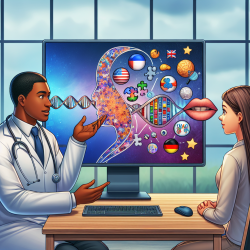Introduction
In the ever-evolving field of pediatric neurology and speech-language pathology, staying updated with the latest research is crucial for improving outcomes for children. A recent case report titled Diagnosis of autism in a rare case of tyrosine hydroxylase deficiency: a case report sheds light on the intersection of Tyrosine Hydroxylase Deficiency (THD) and Autism Spectrum Disorder (ASD). This blog aims to explore how practitioners can leverage these findings to enhance their diagnostic and therapeutic approaches.
Understanding Tyrosine Hydroxylase Deficiency
Tyrosine Hydroxylase Deficiency (THD) is a rare genetic disorder caused by bi-allelic mutations in the TH gene. This gene encodes the tyrosine hydroxylase (TH) protein, which is crucial for the biosynthesis of dopamine, norepinephrine, and epinephrine. THD has a broad phenotypic expression, ranging from mild motor delays to severe infantile parkinsonism and progressive infantile encephalopathy. The prevalence of THD is estimated to be 0.5–1 per million persons, although it is likely underdiagnosed due to overlapping symptoms with other disorders.
The Case Report
The case report discusses a nearly 3-year-old boy referred to pediatric neurology for hypotonia, delayed motor milestones, and expressive speech delay. Whole exome sequencing confirmed a novel variant p.S307C in the TH gene, leading to a diagnosis of THD. The child responded well to carbidopa–levodopa treatment, showing significant improvements in motor skills. Additionally, the boy was diagnosed with ASD due to social pragmatic speech delay, sensory sensitivities, and restricted interests.
Implications for Practitioners
This case report offers several key takeaways for practitioners:
- Consider Genetic Testing: When encountering children with complex developmental delays and motor issues, consider genetic testing to rule out rare disorders like THD.
- Interdisciplinary Approach: Collaborate with pediatric neurologists, geneticists, and developmental pediatricians to provide a comprehensive assessment and treatment plan.
- Early Intervention: Early diagnosis and intervention can significantly improve outcomes. In this case, carbidopa–levodopa treatment led to marked improvements in motor skills.
- Monitor for Comorbid Conditions: Be vigilant for comorbid conditions like ASD in children diagnosed with genetic disorders. This dual diagnosis can guide more tailored therapeutic interventions.
Encouraging Further Research
This case report is the first to describe a patient with both THD and ASD, raising the possibility that THD may be linked to ASD. Further research is needed to explore this potential connection. Practitioners are encouraged to contribute to the growing body of literature by documenting similar cases and sharing their findings.
Conclusion
Understanding the intricate relationship between genetic disorders and neurodevelopmental conditions like ASD can significantly enhance diagnostic accuracy and therapeutic outcomes. By integrating the insights from this case report into clinical practice, practitioners can better serve children with complex developmental needs.
To read the original research paper, please follow this link: Diagnosis of autism in a rare case of tyrosine hydroxylase deficiency: a case report.










